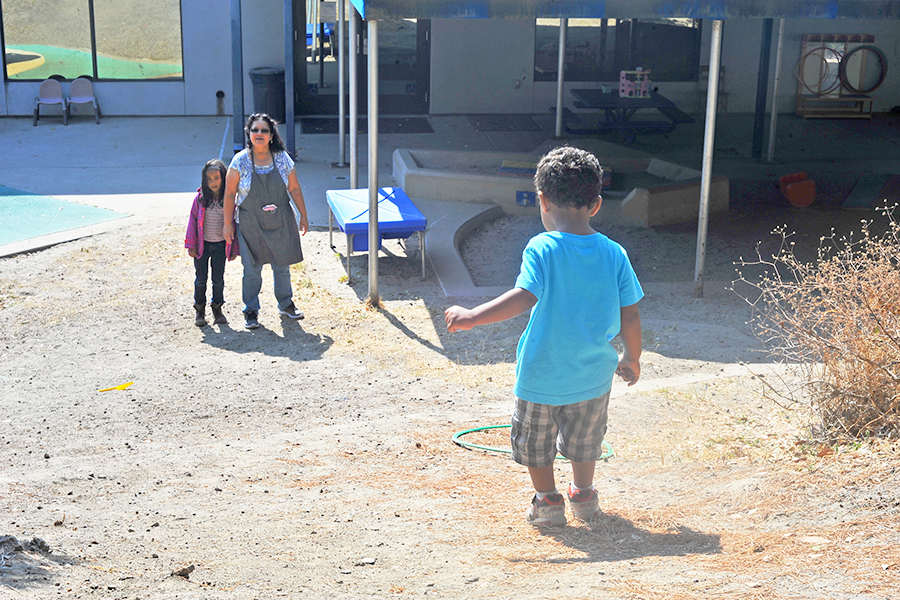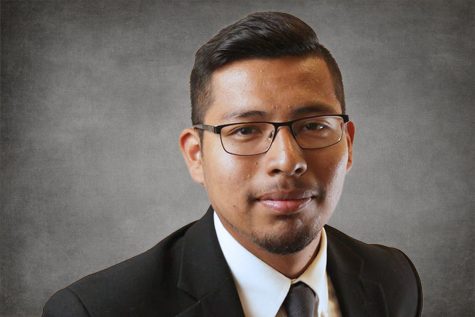Program enhances outside play
A child runs down a hill during afternoon play time in the outside area at the Early Learning Center on Aug. 21.
Aug 23, 2017
The Early Learning Center is preparing its outside space to be the fourth childhood development program in the nation to pilot a Chinese early learning curriculum following a presentation of Anji Play in GE 324 on August 11.
The curriculum focuses on children’s self-determination in choosing where and with whom they will play. The teacher in the program takes on more of an observer role, motoring the children and preventing them from potential hazards.
Anji Play has been implemented in 130 public schools in China and serve 14,000 children ages three to six Xueqin said during her presentation at CCC.
Anji play is the full-time curriculum in all of the public kindergartens in Anji County.
Early Childhood Education Department Co-Chair Sandra Moore said her department has a grant to fund the outside materials needed to become an open lab classroom for the Anji Play program.
“We haven’t fully secured the grant so we do not know a definite amount.” She said.
“Dr. Cheng Xueqin (creator of Anji Play) was able to go over and look at the outdoor area and give us some feedback of what we should do. So, that is our starting point.” Moore said.
She said that the money they receive will be used to buy those materials the children at this location can use to freely play while developing critical thinking skills through supervised risk taking.
Lead Teacher Veronica Galvez said the first changes will be along the hillside in the outside area of the Early Learning Center.
“The kids like to run up and down,” Galvez said.
Since it is a natural thing to do, the kids should be allowed to challenge themselves as they climb or while they go down if they want she said.
As seen on the video played during Xueqin’s presentation, Anji Play in China uses specialized materials like barrels which kids roll as they walk on and ladders that they use to create tracks for rubber tires.
She said these open ended activities allow for a child to create their own way to play said Xuequin.
Moore said that the program is still so new so the process is just beginning and will be ongoing throughout the fall semester.
The ELC will not be getting barrels and ladders but will start in the most natural way Moore said.
For now, staffers who are excited about the coming curriculum have to share the concept with the parents Galvez said.
There is a meeting scheduled on September 8 to talk to many of the parents about Anji Play Galvez said.
This is a very crucial step Xueqin said.
After the teachers learn the concept they must teach the parents Xuequin said.
This is how the process began in China after much resistance from parents she said.
Xueqin said she teaches Anji Play with five core principles: Love, risk, joy, engagement and reflection.
She said that childhood should be honored and so the teacher must put love as the foundation to the relationship with the children for this to work.
Love is the reason for allowing the child take risks during their play time because without risk there is no possibilities of solving problems she said.
This was represented many times in her presentation through videos of children placing mats on the ground besides a tall platform.
After placing the mats, the children took turns jumping from the platform to the mats.
Many times the risk a child takes might seem dangerous, however, early risk taking in play minimizes them getting hurt in the future because they are aware of their capabilities later, Xueqin said.
She said, in Anji Play, teachers are not allowed to enforce rules of play but rather the children conduct their way of play which brings forth an environment that breeds true joy.
“This in turn spurs full engagement of the child’s attention to whatever project they have begun to play,” she said.
Xueqin said, at the end of play time the children must reflect on their play process.
She said children usually draw the process of their play and share their “play stories” with other children.
“It is just like what we are doing here (the presentation of Anji Play).” Xueqin said. “We tell each other what we do and grow from the talk we have about it so that next time we can play better.”
Contra Costa College President Mojdeh Medizadeh who was in attendance for the presentation said, “Although it won’t be exactly as we saw here, we are excited to bring this to CCC.”
She said there was no problems with how the Early Childhood Education department ran the ELC, however, when it comes to education, educators must always be on the lookout for better ways of teaching.
“If we can get better, why not?” Medizadeh said.



